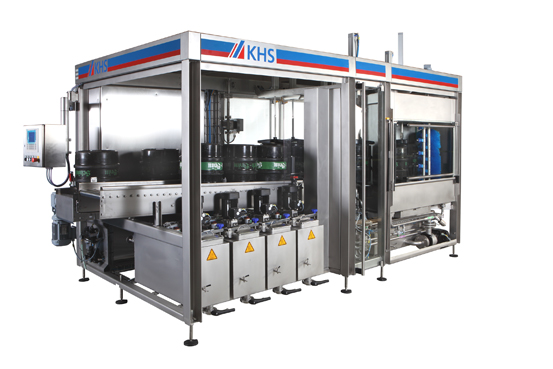Against the backdrop of the economic crisis, the returnable keg has oftentimes been critically appraised. Breweries are reluctant to commit to relatively high long-term investments. Worries about increased keg prices arising from fluctuations in stainless steel prices, together with increased transport costs, have also led to an examination of cost-effective disposable solutions. The keg maintenance backlog underscored the search for alternatives. A look at the drop in the share of draught beer in some markets appeared to some to indicate that the returnable keg was threatened with extinction. But the situation has changed again recently. This article deals with the background and measures that help to maintain the functionality of returnable kegs at a high level.
The Privatbrauerei Raab in Hofheim, Lower Franconia, Germany, has proved once again that a small, private brewery can also contribute to resource conservation and environmental protection while brewing an almost CO2 neutral beer. So that the “solar beers” not only taste great but are also visually appealing to customers, one year ago, the Privatbrauerei Raab installed a new labeling machine manufactured by Gernep GmbH in Barbing, Germany.
In the BRAUWELT anniversary edition [1] Prof. Dr. Frank-Jürgen Methner reported on the development of beer filtration over the past 25 years and gave a synopsis of the status quo and the prospects for the future for this sector. In BRAUWELT International no. 6, 2011, Alfons Witte will report on practical experience in depth filtration with Becopad [2]. Read the following article and find out how the Greenomic technology has developed since its introduction [3] and in practice.
With its Innokeg Till CombiKeg KHS has launched a compact keg washing and racking machine to the market that houses not only the systems for washing the kegs inside and out and filling them, but also the media tanks, controls, and conveyors. Shipped fully assembled in a standard-size container, the compact keg line can be commissioned in the shortest time.
The Lion Nathan Group based in Sydney installed new filtration lines in three of their breweries in 2009 as part of an investment project designed to increase production capacity. A Pall PROFI filtration system and a Handtmann CSS (Combined Stabilization System) unit were installed in each of the breweries. This article describes the decisions that led to the investment, including the stabilization results before and after the installation of the CSS equipment.
With its Innosept Asbofill ABF 611 and Innosept Asbofill ABF 711, KHS launches a new generation of aseptic linear fillers for up to 12,000 plastic bottles per hour. While the standard model, the Innosept Asbofill ABF 611 fills 0.1 to 0.75-liter plastic bottles, the Innosept Asbofill ABF 711 is designed to fill 0.25 to 2.1-liter plastic bottles.
Sidel supplies the first three bottling lines and innovative software for the world’s biggest automated factory. A 66,000 cans per hour canning line, three 144,000 bottles per hour bottling lines, 10 million hectolitres a year, 37 robots: these are only a few of the numbers describing the advanced new plant Grupo Modelo built in Piedras Negras, in Mexico’s Coahuila state near the Texas border.
Beer bottles made of glass represent a product hazard in and of themselves, which from the standpoint of both the glass manufacturer and also the brewery cannot be completely eliminated. Repeatedly, spontaneously exploding beer bottles cause property damage and often result in personal injury. In order to minimize this unavoidable risk, an agreement must be reached between the glass manufacturer and the brewery in the form of a contract specifying the minimum requirements regarding the quality of the glass bottles. When designing glass bottles, one must avoid raised embossing or irregular bottle shapes that can compromise the strength of the glass. This article summarizes the essential requirements and also provides assistance for exercising due diligence regarding this issue; in fact, it is a condensed version of a presentation given at the Second Brewing Science Seminar in Wuhan, China (March 7 – 11, 2011).
Precoat filtration with cellulose fibres
It is the experience of a particular product which appeals to the consumer, according to Rik Olthof of international branding and packaging design consultants Claessens Cartils. He adds: “Branding used to be about information and, more recently, about identification. Nowadays, ‘experience’ is a new dimension that brand owners create with their packaging. It is not the ‘bling’ effect that creates brands, it is the brand’s ability to surprise and inspire, underline the consumer’s identity, and create an emotional atmosphere that is worth sharing”. Innovative
KHS has introduced a new keg washing and racking machine that cleans kegs inside and out, racks them, and has integrated into its cladding up to five media tanks, all controls, and the infeed and discharge conveyors. The Innokeg Till CombiKeg has been designed so that it fits into one container and is supplied ready for action as a Plug & Produce machine, resulting in less time required for installation and commissioning.




